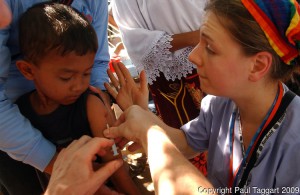Blog


A Dire Need for Nurse Volunteers
According to the World Health Organization (WHO) 1.3 billion people across the world lack access to basic healthcare services, mostly because the number of healthcare workers is not rising fast enough to accommodate the demand of a growing global population. One of the most important resources in addressing these needs in developing countries, is nurses who volunteer their time, skill, expertise and education in hospitals, orphanages, and communities around the world.

Volunteer nurses have the opportunity to do more for patients than they might in their day-to-day work. Our friends at One Nurse At A Time tell us that, as nurses begin working abroad they find the saying, “I’m just a nurse” won’t fly. Not only do they cross over within nursing, but they also do other jobs that go beyond their defined role. Nurse volunteers in developing countries may diagnose, prescribe and treat, as well as run programs, function as pharmacists and assist in surgical procedures. They work with adults and children facing challenges from a wide range of maladies, including basic health care like nutrition, physical check-ups, and pregnancy, to diseases like HIV/AIDS, malaria, yellow fever, and cholera. In addition, they are called on to provide aid during natural disasters, to burn victims, and those requiring reconstructive surgery.
Additionally, volunteer nurses are always needed in centers that offer medical care to physically or mentally disabled children. In developing countries especially, disabled children and adults are often not a medical priority and fall through the cracks. Volunteering to support this vulnerable population of individuals can give volunteers the chance to teach and provide treatment in highly underserved facilities.
Working as a medical volunteer abroad in a country where you may not understand the local language can improve your ability to communicate non-verbally, by using intermediates, charts, and symbols to gauge a patient’s current state and needs. And working with medical peers who have been trained in other countries can expose you to new treatment possibilities, alternative medical care practices, and an overall fresh perspective on the medical industry.
Volunteers often return home thankful for modern medical breakthroughs and with new knowledge of alternative therapies for patients.
We hope this inspires you to volunteer as a nurse.
~Michael and Frida Donner
